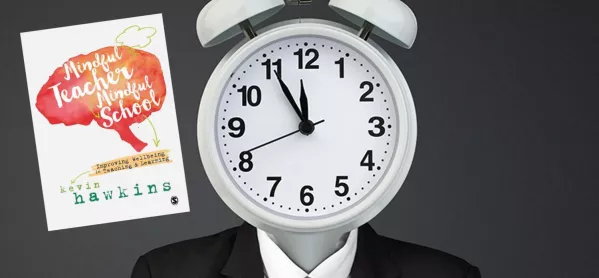- Home
- Book review: Mindful Teacher, Mindful School
Book review: Mindful Teacher, Mindful School

Mindful Teacher, Mindful School
By Kevin Hawkins
Sage
208pp, £18.99 paperback
ISBN: 9781526402868
The mindful movement teaches us that if you feel you don’t have 10 minutes in your day to practise mindfulness, you probably need to do an hour’s practice that day. And thus, it was with a rueful sense of self-awareness - as well as a slightly sinking heart - that I realised I felt far too busy as a senior school deputy head to read, let alone review, this book. With the best intentions in the world, such “luxuries” inevitably fall to the bottom of the priority list as we find ourselves sinking under the weight of emails, marking and the organising of endless Christmas festivities.
But thank goodness I had committed to this review and so was forced to allow myself the space and time to read this excellent contribution to the educational arena; I have no doubt that it has been one of the more useful things I’ve done this academic year.
You know immediately that you are in good hands: Kevin Hawkins cites in his acknowledgements that “almost all of what I know about teaching and learning has come from other teachers and students”.
This from a man who has collaborated with the likes of Jon Kabat-Zinn, a creator of the Stress Reduction Clinic and the Centre for Mindfulness in Medicine, Health Care, and Society at the University of Massachusetts Medical School, and John Abbott, president of the 21st Century Learning Initiative.
The feeling that teaching is about people and experiences every much as it is about research and learning is threaded throughout the text, and as such it will speak clearly and with heart to any teacher, but in particular to those who perhaps have forgotten some of what led them to this profession in the first place. Asking straightforward, focused questions such as “What do you really, deeply want for your children?” and the absolutely crucial “How well are we?” strips the art of teaching back to its human fundamentals; it feels like a necessary and timely intervention for the wellbeing of both our teachers and their pupils.
No quick fixes
It was also enormously encouraging to read Hawkins’ acknowledgement that there is room for cynicism in this take on mindfulness, as he exhorts his reader “not to be so open that you quickly conclude that mindfulness is the answer to all problems”. As someone - confession time -who struggled for a long time with adopting a mindful approach, I am wary of sticking-plaster/one-size-fits-all/zeitgeist notions of pastoral care, and Hawkins is reassuringly sane on this front.
This is not the book to read if you want a quick fix for wellbeing in your school; it’s far too sensible and nuanced for that. Hawkins distinguishes between teaching mindfulness, which requires weeks of dedicated training, such as in the .b curriculum, and teaching mindfully, which involves notions such as increasing our sense of presence and sensitivity to students’ physical cues, and their emotional ones, too.
For leaders in charge of staff wellbeing - and, indeed, for all of us who feel we cannot possibly work any harder but still want to improve our practice - this is a hugely relevant book. One example: take five minutes before just one lesson a day to really “set your intention to be fully prepared before the students arrive…taking some conscious breaths…greeting each student by the door”, rather than frantically responding to an email or marking a book or two. It’s simple stuff, but it’s balm to a frazzled mindset.
Possibly the most interesting focus of this work is its view on changing a school culture, and the inclusion of parents in a mindful whole-school approach. It is here that I think schools can fall down in fulfilling a strategic vision, and heads can seem too quick to dance to the tune of an ever-more-demanding parent body. Without ensuring that parents are, at least, aware of - and, at best, invested in - a school embracing a more mindful approach, the culture will never truly shift, so it is interesting Hawkins states that this is an approach parents have happily welcomed, indeed demanded, in his experience.
Our school’s head of mindfulness would share this view but - and it’s an important “but” that I think Hawkins has glossed over somewhat - what parents say when all is going well and how they respond in extremis are often two very different things. And, as with all aspects of mindfulness, it takes time and patient persistence truly to embed a culture of allowing space and time for quiet reflection and individuality in a world where helicopter parenting still perpetuates.
Hawkins’ book - half manual, half wake-up call - comes, then, highly recommended in an era when time, reflection and slowness seem to be in such scarcity. If we are to help our students, we must first help ourselves. Perhaps the purchase of this text is a first step in that direction.
Fionnuala Kennedy is deputy head pastoral at Wimbledon High School, south-west London
Keep reading for just £1 per month
You've reached your limit of free articles this month. Subscribe for £1 per month for three months and get:
- Unlimited access to all Tes magazine content
- Exclusive subscriber-only stories
- Award-winning email newsletters


